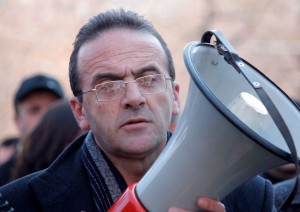Artur Sakunts: “Political persecutions and large-scale illegal actions by the police continued throughout the year”
12:48, December 12, 2016 Human rights defender Artur Sakunts, Chairman of Helsinki Citizens’ Assembly-Vanadzor answered Medialab’s questions.
Human rights defender Artur Sakunts, Chairman of Helsinki Citizens’ Assembly-Vanadzor answered Medialab’s questions.
– Mr. Sakunts, December 10 is the International Human Rights Day; what situation was identified in Armenia in 2016 in this regard?
– This year, the human rights situation in Armenia was significantly influenced by the approach identified in the constitutional amendments imposed in 2015. In other words, the formation of the legal framework and the direction of the legal mechanisms of human rights protection in the country were totally made dependent on the logic of the constitutional amendments imposed by Serzh Sargsyan, i.e. ensuring the mechanism of sustainable political majority, regulation of legal relations under those mechanisms and living in such conditions. This was the main vector expressed directly throughout 2016. This Constitution imposed essentially by falsified results already identified a regress in human rights. It changed the whole philosophy. Unlike before, when we used to bring the constitutional regulations as human rights criteria in terms of wording and approaches in compliance with the international commitments, by Serzh Sargsyan’s Constitution the constitutional standards moved away from Armenia’s human rights commitments and no longer comply with them. We have already mentioned it; I mean the provision that international treaties are guidelines and the wording of legal acts should compulsorily comply with them; in fact, this provision turned from a stricter provision into a more discretionary one. Second, the principle of direct action of the constitutional regulations was removed; third, RA citizens and the Ombudsman have no right to apply to the Constitutional Court on a number of social and economic rights. If one has no right to apply to the Constitutional Court, they apply only to international courts, and here they face a problem in terms of the contradiction between the rulings adopted by international courts and the regulations of their own Constitution. In other words, all the incidents, challenges, attitudes, violations and legal regulations that occurred in 2016 in terms of human rights were all conditioned by the logic under the imposed constitutional amendments, which inherently aimed to restrict human rights. This was first manifested by Gevorg Safaryan’s arrest; political persecutions and large-scale illegal actions by the police continued throughout the year.
– What developments in human rights do you identify after Armenia’s joining the Eurasian Economic Union? In fact, the situation is getting worse year by year.
– After the 2013 statement on joining the Eurasian Economic Union, we entered a phase of uncertainty; I mean that as a Council of Europe member state, we had certain obligations. First, the system of the Eurasian Economic Union was not apparent yet and did not fit into our legal system, but then the tendencies caused by the EEU membership gradually became much more tangible. The approaches and legal regulations became tangible as by joining the EEU, we already had to bring the changes in our legal framework into compliance with the standards of that union new to us. And based on quite a different philosophy, those standards could not but impact both the law-enforcement practice and legislative regulations. As an example, I can mention the Law on NGOs that has already been adopted. The Law was completely incompatible with the Constitutional Court position that NGOs may act as representatives of the public interest. The Law recognized this right only in terms of protection of environmental and historical monuments. It was an unreasonable restriction. I mention the NGOs as they are the main mechanisms of human rights protection.
And the Law on Political Parties indentifies regress in the field of parties. What did they do by the Electoral Code? They removed the provision that observers should take tests and presented it as a step forward, whereas it was a lift of a groundless restriction; and along with that, the Electoral Code strictly limited the legal capability of both NGOs responsible of observation mission, and the mass media responsible for coverage of the electoral process. In other words, there are restrictions not only in the Law on NGOs but also in the Electoral Code; furthermore, they tightened the restrictions by introducing a criminal provision on slur. These are manifestations of an approach obviously reducing and restricting the efficiency of human rights protection mechanisms as forms of the modified Eurasian philosophy.
– And we cannot expect any progress as long as Armenia lives within this philosophy, can we?
– Regretfully, we can see no tendencies of ensuring any progress, but I can say that we have increased the human rights challenges. Now we already face many obstacles and will have to solve more serious problems. And the most recent manifestation was the failure of Armenia together with Russia, Belarus and 5 Central Asian countries to join the International Human Rights Day message developed by 42 countries at the OSCE Foreign Ministers’ Summit. It was announced at the Summit on December 9. Armenia’s failure to join and welcome such an initiative means that it does not feel itself obliged to encourage human rights activities and take on commitments to strengthen human rights mechanisms. And Armenia automatically enters the club we conventionally call EEU.
Apart from the events of July, this year we also saw manifestations of the April war, the absolute unpreparedness of Armenia’s delegation at the UN Committee against Torture and it was a shameful picture. In fact, the authorities could not present any serious arguments as they had done no job. We identified a grave regress in the media as well; I mean the de facto reduced number of television companies in marzes (regions) due to digitization.
Freedom of speech and pluralism is going to be further reduced in Armenia. And that is quite a serious regress in terms of democratic values and human rights.
